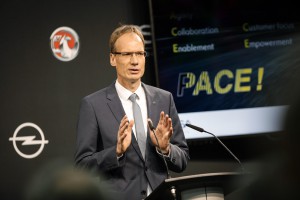
Opel CEO Michael Lohscheller lays out the details for the company's plan, PACE!, to be profitable by 2020.
Opel/Vauxhall officials laid out the plans for the newly separated-from-GM company to be profitable by 2020 while implementing plans to electrify its product portfolio by 2024.
The plan, named PACE!, for profitability includes potential measures to eliminate redundancies with its new parent company, PSA Group. However, Opel/Vauxhall CEO Michael Lohscheller said the company plans to modernize each plant in Europe and allocation of new products will be determined based on plant performance.
“Our clear plan is to refrain from forced redundancies,” he said. “We want to keep and modernize every single plant in Europe.”
However, the plan may only work with some employee flexibility, says PSA Group Chairman Carlos Tavares. He said the turnaround would only work if unions representing 38,000-plus employees agree to a number of cost-saving measures, including flexible working time arrangements, buyouts and early retirement schemes, reported USA Today.
(GM completes sale of Opel/Vauxhall to PSA Group. Click Here for the story.)
“Opel is facing a dramatic situation,” Tavares said. “There is no time to waste.”
Tavares noted that the company has been burning through its cash, losing 19 billion euros, or $22 billion, between 1999 and 2016. The combined market share in Europe currently stands at a modest 5.7%.
Lohscheller noted that all vehicle engineering will now take place in Russelsheim, Germany, and the company reduce the number of platforms on which models will be based and push into as many as 20 new markets including Argentina, Saudi Arabia and Taiwan.
The goal of the new plan is to generate a positive operational free cash flow as well as a recurring operating margin for the auto division of 2% in a first phase by 2020 and of 6% by 2026. Combining strengths will unleash annual synergies on PSA Group of €1.1 billion by 2020 and €1.7 billion by 2026.
(PSA laying out plans for 3-stage return to U.S. market. Click Here for the story.)
All actions will contribute to a lower financial break-even point for Opel/Vauxhall of 800,000 vehicles, creating a profitable business model whatever the headwinds may be, Lohscheller noted.
As part of the transiition and streamlining, areas of expertise will be identified, such as fuel cells, certain automated driving technologies and driver assistance developments. This will further guarantee German engineering quality and affordable innovations.
Altogether, the number of platforms Opel/Vauxhall uses for its passenger cars will be reduced from currently 9 to 2 by 2024. Furthermore, the powertrain families will be optimized from currently 10 to 4. Starting in 2024, all Opel/Vauxhall passenger car models will be based on architectures shared with PSA.
(Opel chief Neumann heads back to VW. Click Here for the story.)
“Aligning architecture and powertrain families will substantially reduce development and production complexity, thus allowing scale effects and synergies, contributing to overall profitability,” said Lohscheller.

